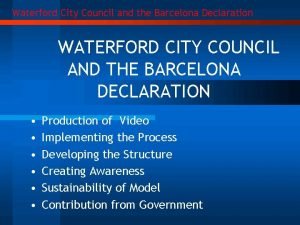Waterford The name Waterford is derived from Vedrarfjiord





- Slides: 5

Waterford The name Waterford is derived from Vedrarfjiord which probably means Fjord of the Rams, maybe a reference to the export of sheep from the area. Waterford is the capital town of the county of Waterford which is located in the Leinster. It is the fifth country the most populated with 50 000 inhabitants and the older country of Ireland.

History • At the beginning, Waterford was just a little port built by the Irish. But in 850, the Vikings realized the strategic and trading importance of the three rivers which empty into Waterford Harbour then they did their first raid on Waterford and in 853 they established a settlement in it. • Between 1987 and 1990, 20% of this area was excavated and it showed that during the Late Viking Age the town was densely populated, well defended, Christianised and prosperous and was the first real Viking settlement in Ireland. • After this time, they developed it in a longphuirt and this was the basis for the town which grew from it. In 1088, the Vikings built a defensive ditch up to 8 meters wide around the town and the Reginald’s tower which is, nowadays, the oldest civic building structure in Ireland.

• After the death of its last viking (Cuionmhain Ua Rabann) in 1037, the city fall under the control of the Leinster Irish Kingdom and in 1137, the king of Leinster (Dermot Mc. Murrough) tries to take Waterford and fails but in 1170 he employs Norman mercenaries and retry to take it. Then he succeed. In 1771, Henry II get off to Waterford. He declared it and Dublin "royal cities". • Throughout the medieval period, Waterford is the second city of Ireland after Dublin. At the end of the fifteenth century, two pretenders to the English throne (Lambert Simnel and Perkin Warbeck) try to take over Waterford without success. As a result, King Henry VII gave the city its motto: Waterford remains the untaken city. • After the Protestant Reformation, Waterford remained a Catholic city and participated in the confederation of Kilkenny. This was ended by Olivier Cromwel and his nephew Henry Ireton took Waterford in 1650. Oliver Cromwell

The eighteenth century was a big period of prosperity for Waterford. Most of the city's best monuments appeared during this time thanks to the famous architect John Roberts. He designed and constructed a lot of monuments like… The Granville Hotel which is the oldest hotel of the country. Thomas Francis Malrer created the Irish flag in that hotel. He has been the first catholic mayor. In 1848, he rebelled against the English and he was sent to Australia. The Christ Church Cathedral which has been at the heart of Waterford City since the 10 th Century when the Vikings built the first Church on the site. But the restored and refurbished cathedral is a 18 th Century building designed by John Roberts. It is the oldest Roman Catholic cathedral in either Britain or Ireland. He died in that cathedral in 1793 at 3: 00 AM.

William Penrose But it has been the Waterford Crystal which has guaranteed the international renown of the country. This crystal manufactory has been created in 1783 by Georges and William Penrose in the port of Waterford. We can discover master pieces of this crystal manufactory in the Museum of Treasures That museum redraws 1000 years of the Irish history with the oldest registers of Ireland, shoes which belonged to the Vikings or also some brooches which date to the 11 th century. A brooch of Viking









